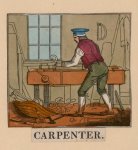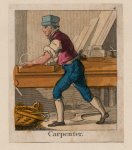Well, it's been a busy couple of weeks since my last post. I had thought by now I would be posting some progress pictures of the bench project, but no such luck. First, we decided the time was right to completely replace the back deck. Second, Teague decided that CDs make great toys. Given the chance, he would sit and open them by the dozen - rolling them across the floor, walking on them, throwing them over his shoulder etc. He loved it; the CDs and I hated it. So...
Making boxes for the CDs to live in rose to the top of the shop list. My plan was to keep it simple. Long narrow boxes with a single handle on the front that would slide in and out on the lower shelves of the Shaker Cupboard. Construction wise, these were just glued and nailed butt joints. Process wise, it was an exercise in repetition. Repeatedly cutting duplicate parts is not something I tend to enjoy, but it did provide some interesting opportunities to learn, and relearn some skills.
Here's a shot of all the parts (actually, the stack of backs are not in the picture...) waiting for assembly. On the right is the first box I made to serve as the prototype. Here it is demonstrating that it would also be handy for holding DVDs. Hmm. Maybe another ten boxes are in my future...

You can also see that I just couldn't leave things simple. I decided it was worth the time to put a simple molding on the top edge of the box fronts. I chose a cove profile. Partly this was because I liked the visual effect, but to be honest, it was also because I had just acquired this plane, recently rehabbed it, and wanted to put it right to work on a project.
Planing the cove in the fronts also provided me with the perfect opportunity to relearn the power of hollow and round planes. The wood I had selected for the fronts had some wild grain and on one section, the cove molding plane produced some fantastic tear-out. Molding planes can't be reversed to cut with the grain for one section; they are strictly one-way planes. H&Rs on the other hand can work either direction. So, after looking at the tear-out for a few seconds, I heard the #6 round plane calling from the shelf: "Put me in coach!" I did, and he really cleaned up nicely!
You may also notice two saws in the last photo. Both are small cross-cut panel saws, but they have an important difference. The one on the bottom is my normal "go to" saw. It is 12 tpi with minimal set, and produces a very clean end grain surface. However, this wood had some serious reaction as it was cut due to stresses within the board. With the saw only an inch or two into the cut, the kerf was closing up on the saw blade like a vise. If this effect is minimal, you can sometimes just run the saw back through the kerf to widen it and provide enough relief. These boards called for more drastic measures. Again - to the bullpen! Enter the 9 tpi panel with more aggressive set. It does not leave as smooth a surface, but the extra set leaves a significantly wider kerf which does not close up and bind the saw. Just another example of how having multiple tools allows for a flexible approach. (If you didn't notice it, that was a thinly veiled rationalization for buying more tools...)
Here are the boxes assembled, awaiting clean-up and the mounting of the hardware:

Cleaning up the joints with a plane allowed me to enjoy another tool that has been patiently waiting to be put back into use. In the past, when it was time to plane end grain, I would reach for my Stanley #65 low angle block plane. This time however, I used my Stanley #62 bevel-up jack plane. (It's visible back in the first photo - and I guess technically it really is just a giant block plane...) I had picked this up at an antique show down in Oregon, at a truly gloatable price, but hadn't used it yet. Wow! This thing knew how to cut end grain! I think that #65 might just find itself sitting on the shelf more often.
For a cleaner look on the fronts, I deep punched the nails, drilled out the holes to 1/8th of an inch, and then pegged these with dowels. A few swipes with a smoothing plane wrapped things up.
And they're finished:

I'll try to post a picture of these in their new, 1 1/2 year-old proof, home as soon as I get a decent shot. Hmm, I probably just jinxed myself. Now Teague will figure out how to get the cupboard open, and I'll be back where I started. I gotta learn not to say stuff like that!










Nice job Dan! This is one of those projects I've needed myself for a long time. I like the upside down coathooks for handles too. Very clever. And don't worry, Teague will likely have figured out how to open the cupboard before you even have all of the boxes put in it. Cabinet locks are your friends!
ReplyDeleteBob - Yeah, he already knows how! I haven't installed locks on that yet (bathrooms and kitchen are done) but in the meantime, a rubberband tight around the knobs has kept him at bay...
ReplyDeleteThanks for appreciating the hook/handles. I originally wanted one wooden knob on each box, but with no time to turn them on the treadle lath (not the lathe's fault - not enough skill on my part)and nothing useable at the Borg, I had to get creative. Actually, they look better than I had hoped, and work great, since you have to lift the box in order to slide it out. The hook shape works even better than a knob would have.